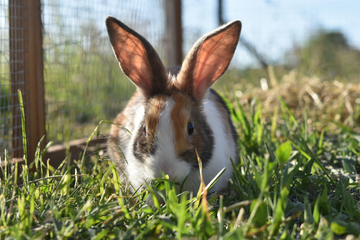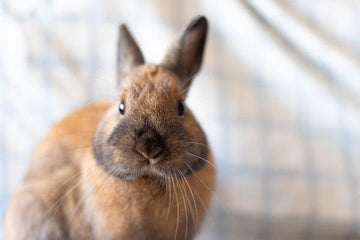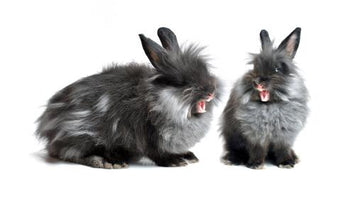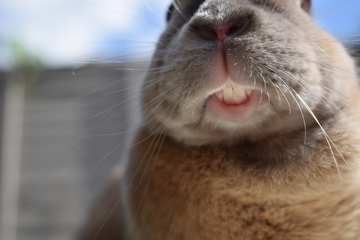How Many Fresh Veggies Should Rabbits Eat?
Rabbits are not only delightful companions but also unique creatures with specific dietary needs. As a responsible rabbit owner, you want to ensure your furry friend receives a well-balanced diet to promote overall health and longevity. One crucial aspect of their diet is the inclusion of fresh vegetables. But, you may wonder, how many fresh veggies should rabbits eat? Let's dive into the world of rabbit nutrition and explore the optimal quantity of fresh veggies to keep your pet rabbit happy and healthy.
Click Here For a Guide to Understanding Your Rabbits Diet.

Understanding the Importance of Fresh Vegetables
Before we discuss the quantity, let's explore why fresh vegetables are a vital component of a rabbit's diet. In the wild, rabbits graze on a variety of fresh greens, and replicating this natural diet in captivity is essential for their well-being. Fresh vegetables provide essential nutrients, hydration, and fiber, contributing to healthy digestion and overall vitality.
How Many Fresh Veggies Are Ideal?
The key is to strike a balance. While fresh vegetables are essential, they should complement the primary component of a rabbit's diet—grass hay. Here are some guidelines to help you determine the ideal quantity of fresh veggies for your rabbit:
-
1 to 2 Cups per 6 Pounds of Body Weight: A general rule of thumb is to offer 1 to 2 cups of fresh vegetables for every 6 pounds of body weight. This ensures your rabbit receives a sufficient amount of nutrients without compromising the primary role of grass hay in their diet.
-
Gradual Introduction: Introduce fresh vegetables gradually, starting with small amounts and monitoring your rabbit's response. This helps prevent digestive issues and allows your rabbit to adjust to new foods.
-
Variety is Key: Offer a variety of fresh vegetables to ensure a broad spectrum of nutrients. Include leafy greens such as beet greens, collards, and romaine lettuce, along with other veggies like celery, bell peppers, and cucumbers. Rotate the vegetables regularly to provide diversity. Please note, that while you may feed your rabbit these veggies they are only recommended daily in limited supply.
-
Monitor Weight and Health: Keep a close eye on your rabbit's weight and overall health. Adjust the quantity of fresh veggies based on their individual needs, as factors like age, activity level, and health conditions can influence dietary requirements.
Tips for Offering Fresh Veggies
-
Wash Thoroughly: Before offering fresh veggies, ensure they are thoroughly washed to remove any pesticides or contaminants.
-
Serve Fresh Daily: Provide fresh vegetables daily to ensure your rabbit receives a continuous supply of essential nutrients.
-
Observe Preferences: Rabbits can be picky eaters. Observe their preferences and adjust the variety of veggies accordingly.
-
Avoid Toxic Foods: Some vegetables, like onions and garlic, can be toxic to rabbits. Familiarize yourself with safe and unsafe foods for rabbits.
The Importance of Hay in the Rabbit Diet
While fresh veggies are crucial, it's essential to emphasize the significance of pure, loose hay in a rabbit's diet. Hay serves as the primary source of fiber, promoting healthy digestion and wearing down their continuously growing teeth. Rabbit Hole Hay's premier-quality hay, grown in the finest hay regions, is an excellent choice to ensure your rabbit receives the essential fiber they need.
A Balanced Diet for a Happy Rabbit
The key to a healthy and happy rabbit lies in a well-balanced diet. Fresh vegetables play a crucial role in providing essential nutrients and hydration. Our commitment to small pet care aligns seamlessly with the principles of a balanced rabbit diet, emphasizing the importance of high-quality hay as the cornerstone of their nutrition.
As you navigate the world of rabbit care, remember that each rabbit is unique, and their dietary needs may vary. Pay attention to your pet's cues, monitor their health, and with the right combination of fresh veggies and premium hay, you'll be well on your way to providing your furry friend with a diet that promotes optimal well-being and longevity!

Rabbit Is It Low Maintenance or More Work Than You Think?

Signs of Rabbit Health: What You Should Know

Decoding Bunny Behavior: Understanding Rabbit Mood







